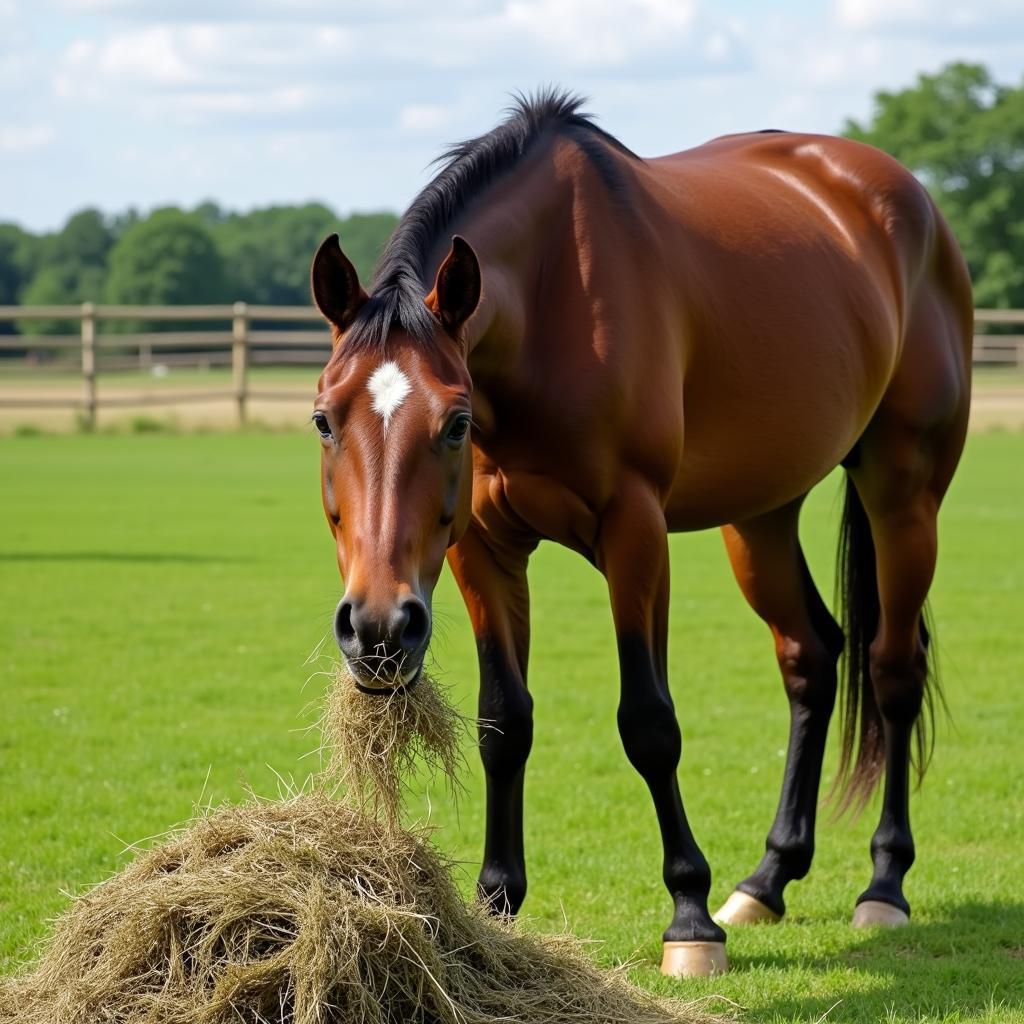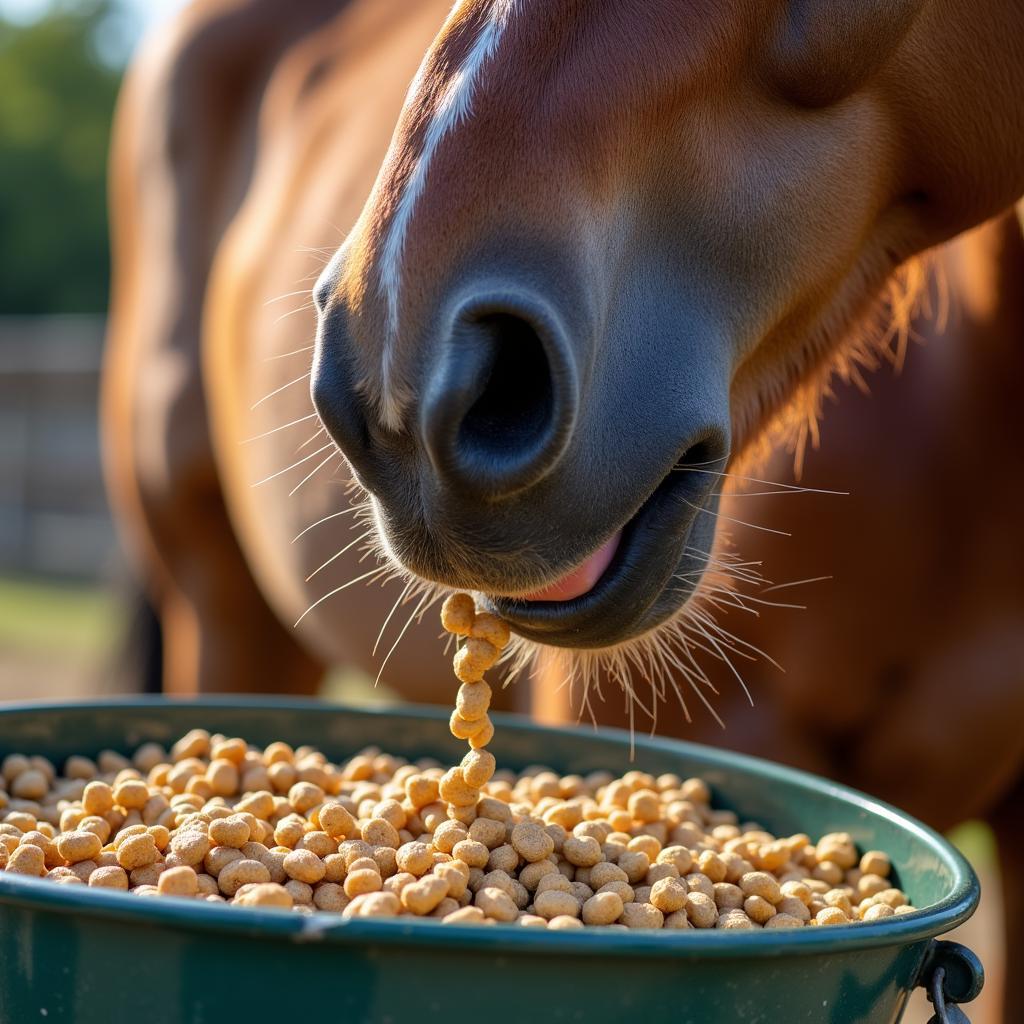Choosing the right horse feed can be overwhelming with so many options available. Understanding the basics of equine nutrition and the different types of horse feed is essential for your horse’s health and performance. This comprehensive guide will explore ten common types of horse feed, their benefits, and how to select the best options for your equine companion.
Understanding the Basics of Horse Feed
Horses are herbivores with a unique digestive system designed to process forages like grass and hay continuously. A balanced diet for a horse should always prioritize high-quality forage as its foundation.
 Horse Eating Hay in Pasture
Horse Eating Hay in Pasture
Beyond forage, a horse’s nutritional needs depend on several factors, including:
- Age: Growing horses, senior horses, and pregnant or lactating mares have different nutritional requirements.
- Workload: Performance horses require higher calorie and protein intake compared to recreational horses.
- Health Condition: Horses with specific health conditions may need specialized diets.
10 Common Types of Horse Feed
1. Hay: The Cornerstone of Equine Nutrition
As mentioned earlier, hay should constitute the majority of a horse’s diet. It provides essential fiber, vitamins, and minerals. There are various types of hay:
- Timothy Hay: A popular choice for many horses, known for its moderate calorie and protein content.
- Alfalfa Hay: Higher in calories and protein than Timothy hay, making it suitable for growing horses, performance horses, and lactating mares.
- Orchard Grass Hay: Another excellent option with good nutritional value.
2. Grain: A Concentrated Energy Source
While hay is crucial, grain can supplement your horse’s diet with additional calories and energy, especially if they have higher energy needs. Common grains include:
- Oats: A highly palatable grain that provides a good energy source.
- Corn: A concentrated energy source, best fed in moderation.
- Barley: Higher in calories than oats but should be processed (rolled or crimped) for optimal digestion.
3. Pelleted Feeds: Convenience and Balanced Nutrition
Pelleted feeds combine various ingredients, including grains, hay, vitamins, and minerals, into convenient pellets. These feeds offer balanced nutrition and are often formulated for specific life stages or activity levels.
4. Complete Feeds: A Simplified Approach
Complete feeds are designed to be the sole source of nutrition for a horse, eliminating the need for separate hay and grain. They typically come in a pelleted form and contain all the essential nutrients a horse needs.
 Horse Enjoying Pelleted Feed
Horse Enjoying Pelleted Feed
5. Senior Feeds: Meeting the Needs of Aging Horses
As horses age, their digestive system becomes less efficient. Senior feeds are specially formulated to be easily digestible and often contain prebiotics and probiotics to support gut health.
6. Supplements: Addressing Specific Needs
Supplements can target particular nutritional deficiencies or support specific health concerns like joint health, hoof health, or respiratory health. Common supplements include:
- Joint Supplements: Containing ingredients like glucosamine and chondroitin to support joint health.
- Biotin: Essential for healthy hooves.
- Electrolyte Supplements: Important for replacing electrolytes lost through sweat, especially during hot weather or intense exercise.
7. Salt and Mineral Blocks: Essential Minerals
Horses need free access to salt and mineral blocks to supplement their diets with essential minerals like sodium, calcium, and phosphorus.
8. Treats: A Rewarding Addition
While treats should be given in moderation, they can be a great way to reward your horse or provide positive reinforcement during training. Opt for healthy treats like apples, carrots, or commercially prepared horse treats.
9. Pasture Grass: Nature’s Bounty
Access to fresh pasture grass is highly beneficial for horses, providing natural grazing opportunities and essential nutrients.
10. Water: The Most Important Nutrient
Never underestimate the importance of fresh, clean water. Horses need to drink ample water, especially during hot weather or after exercise, to stay hydrated and support bodily functions.
Choosing the Right Horse Feed: Factors to Consider
- Consult your veterinarian or an equine nutritionist: They can help you determine your horse’s specific needs and create a balanced diet plan.
- Read feed labels carefully: Pay attention to the ingredients, guaranteed analysis, and feeding recommendations.
- Introduce new feeds gradually: This allows your horse’s digestive system to adapt.
- Monitor your horse’s weight and body condition: Adjust feeding amounts as needed to maintain a healthy weight.
 Equine Nutritionist Examining a Horse
Equine Nutritionist Examining a Horse
Proforce Fuel: Powering Performance
For horse owners seeking a high-performance feed, Proforce Fuel horse feed is an excellent option. It is specifically designed to provide the energy and nutrients needed for athletic horses.
Conclusion: A Balanced Diet for a Healthy Horse
Providing your horse with a balanced and appropriate diet is crucial for their overall health, well-being, and performance. By understanding the different types of horse feed available and considering the factors discussed above, you can make informed decisions to ensure your equine companion thrives. Remember to consult your veterinarian or an equine nutritionist for personalized guidance.
FAQs about Horse Feed
1. How much hay should I feed my horse?
The general rule of thumb is to feed 1.5% to 2% of their body weight in hay per day.
2. Can I feed my horse too much grain?
Yes, feeding too much grain can lead to health issues like colic and laminitis. Follow feeding recommendations carefully.
3. Are treats okay for my horse?
Treats are fine in moderation. Choose healthy options like apples, carrots, or commercially prepared horse treats.
4. What should I do if my horse loses weight?
Consult your veterinarian to rule out any underlying medical conditions and adjust their diet if needed.
5. Is it necessary to supplement my horse’s diet?
Supplementation depends on your horse’s individual needs and the quality of their forage and feed.
Have any more questions about 10 Horse Feed options or need help finding the best hay for your horse?
Contact us! Call: 0772127271, Email: [email protected] Or visit us: QGM2+WX2, Vị Trung, Vị Thuỷ, Hậu Giang, Việt Nam. Our 24/7 customer support team is here to help.
You might also find these resources helpful:
- Learn more about choosing the best hay for horses.
- Explore the benefits of Purina Enrich Plus horse feed.
- Discover more about the unique needs of the MFM horse.
- Looking for horse boarding in Sarasota, FL? We can help!